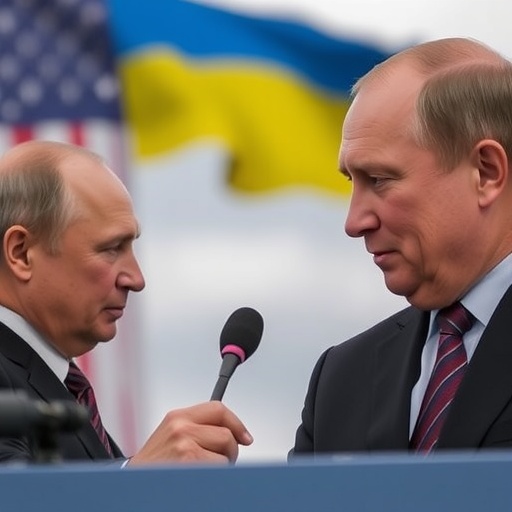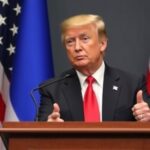In a stark display of resolve, Russian President Vladimir Putin declared on Thursday that Moscow will not yield to mounting US sanctions, even as the latest measures slam Russia’s vital oil sector amid the protracted Ukraine conflict. Speaking from the Kremlin, Putin dismissed the penalties as futile attempts to ‘strangle’ Russia’s economy, vowing to pivot toward alternative markets and technologies to weather the storm.
The new sanctions, announced by the US Treasury Department, zero in on major Russian oil companies like Rosneft and Gazprom Neft, aiming to curb Moscow’s war funding by restricting access to global financial systems and technology imports. This escalation comes as the Ukraine war enters its third year, with Western allies intensifying pressure to halt Russian advances in eastern Ukraine.
Putin‘s Unyielding Rhetoric Echoes Through Kremlin Halls
President Putin’s response was delivered during a televised address to the Russian Federal Assembly, where he painted the sanctions as a desperate ploy by the West to undermine Russia’s sovereignty. ‘We will not bend to these coercive measures,’ Putin stated firmly, his voice carrying the weight of national pride. ‘The American sanctions seek to punish our people, but they will only strengthen our determination to defend our interests in Ukraine and beyond.’
Putin’s defiance is not mere bluster; it reflects a pattern seen throughout the Ukraine invasion. Since February 2022, when Russian forces crossed into Ukraine, Putin has repeatedly framed Western sanctions as economic warfare, arguing they unite Russians against external threats. In this latest speech, he acknowledged the ‘temporary hardships’ the sanctions could impose, estimating potential GDP contractions of up to 2-3% in the coming quarters, according to Russian economic ministry projections. Yet, he countered with optimism, highlighting Russia’s growing ties with China and India, which have absorbed much of its oil exports rerouted from Europe.
Analysts note that Putin’s messaging serves dual purposes: bolstering domestic morale and signaling to allies that Russia remains resilient. ‘This is classic Putin—turning adversity into a narrative of endurance,’ said Maria Lipman, a Russia expert at the Carnegie Endowment for International Peace. Her assessment underscores how such rhetoric has helped maintain public support for the war, with recent polls from the Levada Center showing approval ratings for Putin’s handling of the economy hovering around 70% despite inflationary pressures.
Sanctions Strike at Heart of Russia’s Oil Powerhouse
The US sanctions package, unveiled on Wednesday, represents one of the most aggressive moves yet against Russia’s energy backbone. Targeting entities like Rosneft—the world’s largest publicly traded oil company by reserves—the measures prohibit US firms from providing financing, insurance, or equipment to these oil giants. This builds on previous rounds that have already slashed Russia’s oil revenues by an estimated 40% since the war began, per data from the International Energy Agency (IEA).
Key components include:
- Financial Restrictions: Bans on transactions involving US dollars for oil-related deals with sanctioned firms, effectively isolating them from Western banks.
- Technology Blacklist: Prohibitions on exporting drilling and refining tech, which Russia relies on for maintaining output levels above 10 million barrels per day.
- Secondary Sanctions: Penalties for third-party countries or companies that continue business with Russian oil entities, deterring indirect support.
Russia’s oil companies, which account for nearly 40% of federal budget revenues, are now scrambling to adapt. Rosneft CEO Igor Sechin warned in a company statement that the sanctions could disrupt up to 20% of export operations, particularly to Asia. Gazprom Neft, another hit, reported a 15% dip in Q3 profits last year due to prior measures, and executives fear further declines as global prices fluctuate amid OPEC+ production cuts.
From an SEO perspective, these sanctions highlight the intricate web of global energy politics, where Russia’s Ukraine aggression has ripple effects on oil prices worldwide. Brent crude, for instance, surged 5% following the announcement, reflecting market jitters over supply disruptions.
Economic Ripples Hit Russian Households and Global Markets
While Putin’s assurances aim to steady nerves, the sanctions’ bite is already evident in Russia’s economy. Inflation has climbed to 8.5% year-over-year, driven by import shortages and ruble volatility, according to the Central Bank of Russia. Oil companies, employing hundreds of thousands, face layoffs and reduced investments; Lukoil, though not directly named, has echoed concerns about cascading effects on the sector.
Statistics paint a grim picture: Russia’s oil exports to Europe plummeted from 2.5 million barrels per day pre-war to under 500,000 now, forcing a pivot to discounted sales in India and China. This has saved Moscow from total collapse but at a cost—revenues are down $100 billion annually, per IEA estimates. Ukrainian officials, meanwhile, hail the measures as a ‘vital step’ toward victory. President Volodymyr Zelenskyy tweeted, ‘Every sanction weakens Putin’s war machine and brings us closer to peace.’
Broader implications extend to global energy security. With winter approaching, Europe’s reliance on alternative suppliers like Norway and the US has strained supplies, pushing LNG prices up 30%. Experts warn that if Russia retaliates by curbing gas flows through Ukraine—already reduced by 50%—it could trigger a humanitarian crisis in Eastern Europe.
In Russia, everyday citizens feel the pinch. Supermarket prices for imported goods have risen 25%, and a Moscow Times survey revealed 45% of respondents worry about job losses in energy-dependent regions like Siberia. Putin’s government has countered with subsidies and a ‘parallel import’ scheme, allowing gray-market goods from friendly nations, but economists doubt its long-term sustainability.
International Backlash and Ukraine’s Battlefield Gains
The US move has garnered mixed global reactions, underscoring divisions in the international community. NATO allies like the UK and Germany pledged similar sanctions on Russian oil firms, with the EU considering a price cap extension. China, however, criticized the actions as ‘hegemonic interference,’ while India maintained its neutral stance, continuing to buy discounted Russian crude—up 80% since 2022, per trade data.
In Ukraine, the sanctions fuel optimism amid recent military successes. Ukrainian forces reclaimed territory near Kharkiv last month, bolstered by Western arms. Kyiv’s foreign minister, Dmytro Kuleba, stated in a press briefing, ‘These penalties on Russia’s oil companies directly undermine the funding for tanks and missiles terrorizing our cities.’ The conflict has claimed over 500,000 lives on both sides, according to UN estimates, with sanctions seen as a non-military lever to tip the scales.
Putin’s inner circle remains defiant. Foreign Minister Sergey Lavrov accused the US of ‘economic terrorism’ during UN talks, vowing retaliatory measures like export bans on rare earth metals critical for tech industries. This tit-for-tat could escalate tensions, potentially drawing in more players like Iran, which has deepened oil ties with Russia.
Navigating Uncertainty: Russia’s Pivot and the Path to Resolution
Looking ahead, the sanctions’ success hinges on enforcement and Russia’s adaptability. Moscow is investing heavily in shadow fleets—hundreds of tankers evading Western oversight—to sustain oil flows, though at higher costs. Putin has greenlit $50 billion in domestic energy projects, aiming for self-sufficiency by 2025, including Arctic drilling expansions.
Yet, cracks appear. Insider reports suggest discord within Russia’s elite, with oligarchs linked to oil companies lobbying for de-escalation. The Ukraine war’s toll—$200 billion in direct costs for Russia—prompts questions about sustainability. International mediators, including Turkey, propose peace talks, but Putin insists on recognizing annexed territories as a precondition.
For the global stage, these developments signal a reconfiguration of energy alliances. As the US pushes allies toward renewables, Russia’s pivot to BRICS nations could reshape trade blocs. In Ukraine, every barrel of sanctioned oil denied translates to fewer resources for the front lines, offering hope for a negotiated end. Whether Putin’s defiance holds or bends under economic strain remains the pivotal question in this high-stakes geopolitical chess game.








